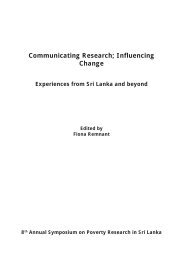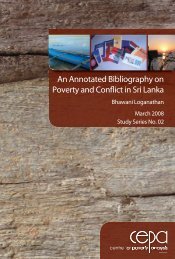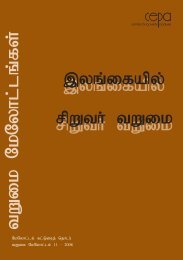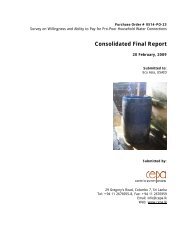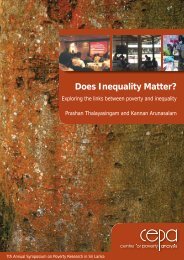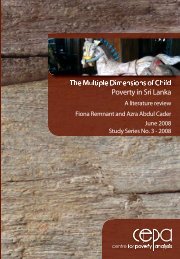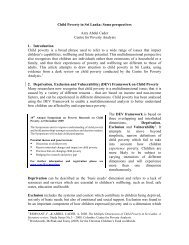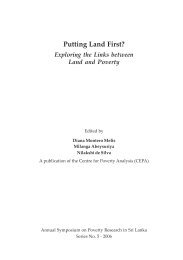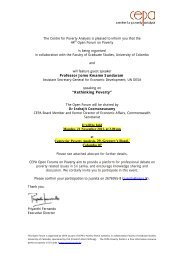Involuntary Displacement and Resettlement â Policy and ... - CEPA
Involuntary Displacement and Resettlement â Policy and ... - CEPA
Involuntary Displacement and Resettlement â Policy and ... - CEPA
- No tags were found...
Create successful ePaper yourself
Turn your PDF publications into a flip-book with our unique Google optimized e-Paper software.
assist people in need risk being diverted from attending to others incomparable or even greater need than the IDPs. Such unintendedconsequences of labelling create jealousy <strong>and</strong> troubled feelings amongthose not entitled to assistance. It may lead to tension between thetwo groups. I have earlier described how such jealousies among localpeople contributed to violent conflict between IDPs <strong>and</strong> hosts in someareas of Puttalam (Brun 2008).However, despite the privileging effect of the IDP category, this maynot always lead to IDPs being the stronger group because they are ‘outof place’ as mentioned above <strong>and</strong> the hosts have the right to controlthe place. This is related to the third category of unintended consequencesof the labelling processes:3) The localising effect: As I have shown above, the IDP <strong>and</strong> hostcategories indicate particular rights to particular places. The IDPcategory implies that northern Muslims belong to the north – <strong>and</strong> theirrights as local citizens of Puttalam have thus been restricted. Being anIDP has become the right to a particular place. Again, this may createparticular vulnerabilities. For example, in December 2000, a cyclonedamaged many cadjan houses in the welfare centres. Those whosehouses were damaged by the cyclone could not get any support fromthe national Social Service Department responsible for relief followingnatural disasters because the IDPs were already on a compensationscheme, namely the food rations. People pleaded with the localauthorities in Puttalam for support to rebuild their houses, but got nosupport because the IDPs were not local citizens (Brun 2003). Also inthe current situation when the war is understood to be over, it is morecommonly being suggested that the northern Muslims should return tothe north. This pressure to return may, however, not suit everyoneafter having been in Puttalam for the past 20 years <strong>and</strong> made theirlives <strong>and</strong> livelihoods there.4) Politicisation <strong>and</strong> de-politicisation: The consequences of labellingmust be understood in the political context in which the labels havebeen formed. The IDP category both politicises <strong>and</strong> depoliticises thenorthern Muslims. The locational right is at the centre of theseprocesses. Politics of mobility <strong>and</strong> identity have been importantelements of the conflict in the country. To be able to use internaldisplacement as a way of controlling where people should live <strong>and</strong>when people should move is quite useful <strong>and</strong> by labelling people IDPsone makes it less politically sensitive to pursue such control.138



